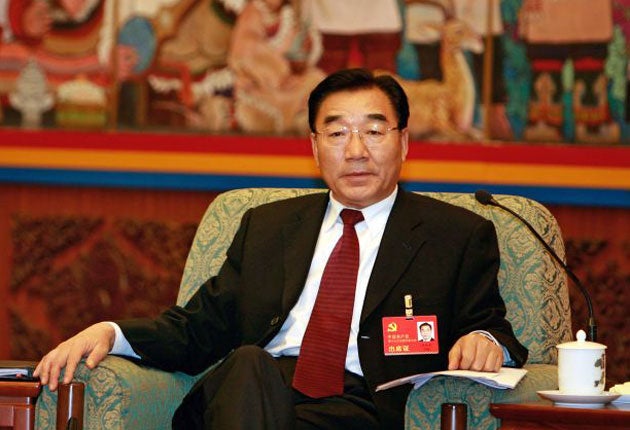Beijing sets 'bulldog of Tibet' on its Catholics

Your support helps us to tell the story
From reproductive rights to climate change to Big Tech, The Independent is on the ground when the story is developing. Whether it's investigating the financials of Elon Musk's pro-Trump PAC or producing our latest documentary, 'The A Word', which shines a light on the American women fighting for reproductive rights, we know how important it is to parse out the facts from the messaging.
At such a critical moment in US history, we need reporters on the ground. Your donation allows us to keep sending journalists to speak to both sides of the story.
The Independent is trusted by Americans across the entire political spectrum. And unlike many other quality news outlets, we choose not to lock Americans out of our reporting and analysis with paywalls. We believe quality journalism should be available to everyone, paid for by those who can afford it.
Your support makes all the difference.The hardline official who led Beijing's tough response to the Dalai Lama and his Tibetan Buddhist supporters has shifted jobs to tackle a new target: the country's embattled Catholics.
Zhang Qingli, known as the "Tibetan bulldog", has been made Communist Party Secretary of Hebei province, which is home to around a quarter of China's Roman Catholics and where tensions between the state and the Vatican run at their highest.
The appointment was revealed as a Chinese court sentenced a Tibetan Buddhist monk to 11 years in jail for hiding another monk who set himself on fire. The death was seen as a protest against China's heavy-handed controls on Tibetan Buddhism and provoked a stand-off between security forces and monks.
Catholics are required to join the official Chinese Catholic Patriotic Association, which has five million members and has repeatedly angered Rome by naming bishops without the Vatican's approval.
The Holy See estimates that about eight million Chinese Catholics worship secretly in churches not recognised by the government and many of these are in Hebei, which surrounds Beijing and has a population of 70 million. During his time in Lhasa, Mr Zhang gained a reputation as an unyielding party secretary of the heavily Buddhist region. He was particularly well known for his tough stance against the exiled Dalai Lama, and once described him as "a wolf in monk's robes, a devil with a human face but the heart of a beast".
Relations between Beijing and the Holy See worsened late last year after Pope Benedict XVI's Christmas Day message deplored the persecution of Chinese Catholics. Last month, the Vatican denounced the ordination of a Chinese bishop without papal approval and excommunicated him. Much to Beijing's irritation, the Vatican is one of a handful of states that extends diplomatic recognition to the self-ruled island of Taiwan.
The US-based Cardinal Kung Foundation, which highlights the cases of oppressed priests in China, says there are 25 underground bishops, and all of them are either in jail, under house arrest, under strict surveillance, or in hiding.
All eight priests listed as prisoners by the foundation are from Hebei province, while most of the missing or jailed bishops come from there.
Join our commenting forum
Join thought-provoking conversations, follow other Independent readers and see their replies
Comments